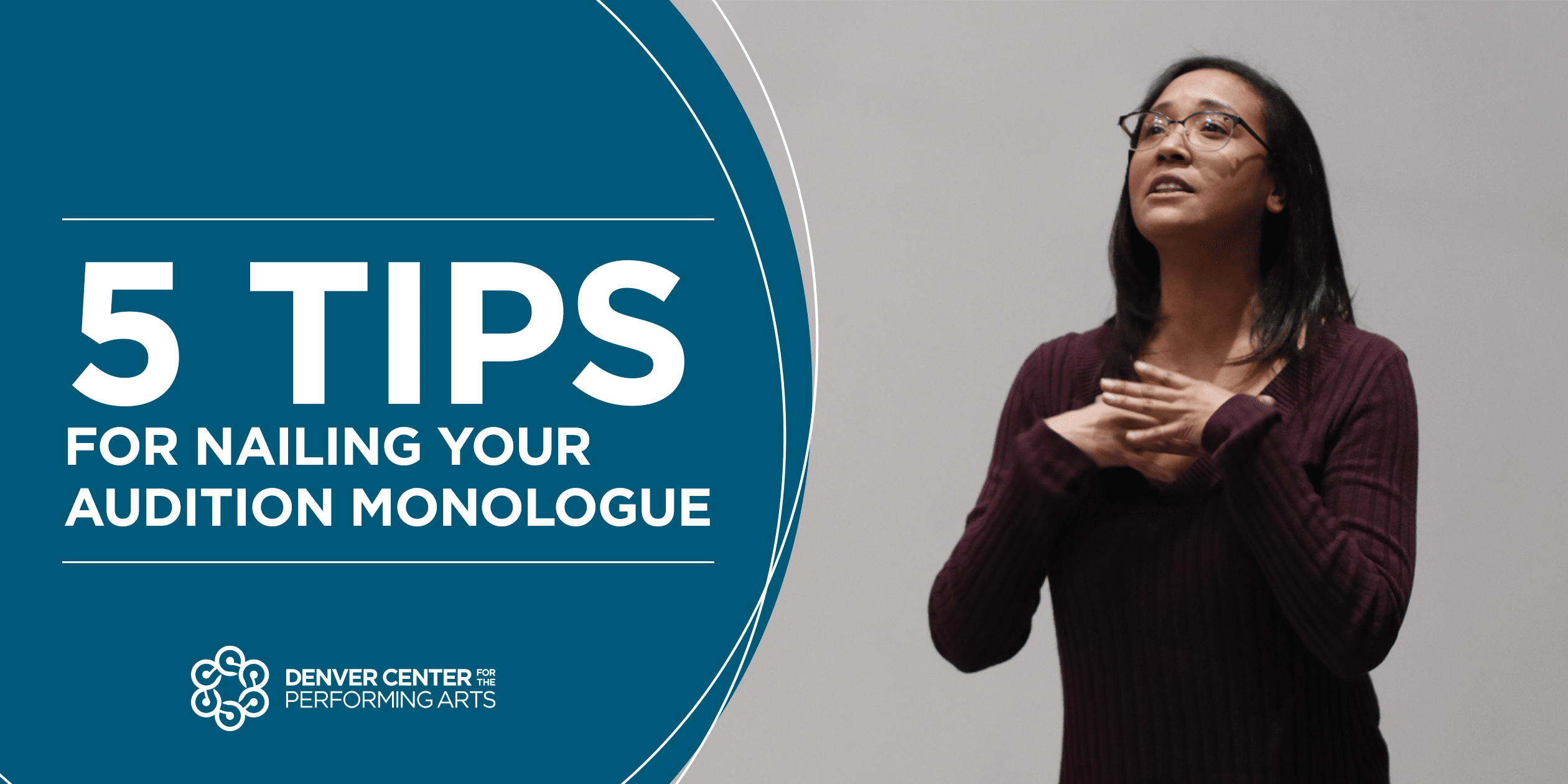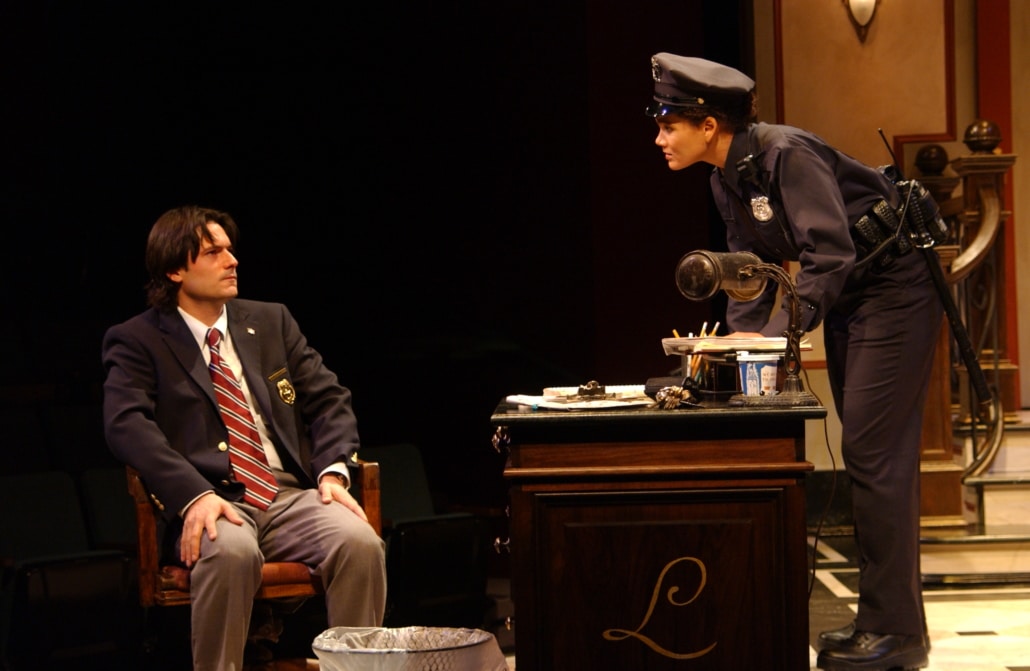DCPA NEWS CENTER
Enjoy the best stories and perspectives from the theatre world today.
Enjoy the best stories and perspectives from the theatre world today.

If you’re like most actors, you’ve felt your fair share of nerves heading into the audition room. You’re hoping to make a good impression, show off your skills, and land the job, all within a matter of minutes. While those nerves never really go away, being prepared with an outstanding audition monologue can boost your confidence as you walk into any audition.
Performing monologues is a great challenge. So much of acting is about connection, being present and engaged with your partner(s) on stage, and listening and responding. In an audition scenario with a monologue, you are now being asked to add using your imagination to create the person you are connecting and speaking to, to be present with this imaginary person, and still to listen and respond! We sat down with Timothy McCracken, Denver Center for the Performing Arts Head of Acting, to ask what steps an actor can take to help nail their audition monologue. Here are five of his top tips:
If you want to make sure that your monologue has emotional resonance, then it’s important to choose a piece that, well, resonates. In other words, you need to select a piece that you feel personally connected to. Do you identify with the character? Do you connect with the arc of the story? Do you understand the character’s motivation? If you can answer “yes” to these questions, then that connection will translate into familiarity and ease as you give your monologue. Choosing a monologue you genuinely like will help you relate to the character and objective of the piece, which will enhance your performance in the audition room.
Equally important to liking the monologue is liking (and knowing) the source material. Ideally, you don’t want to pull a monologue from a play you’ve never read or a monologue book. If you’re not familiar with the source material, you’re not going to fully understand the journey of your character or where they’re at in the given moment, which will show in your delivery. “The top priority [in a monologue],” Tim said, “is sharing material that gives you an opportunity to show your skills.” So make sure that you’ve not only read the material completely but that you actually like it.
By its very nature, a monologue will have a certain amount of disconnect. You’ve taken a part of a larger scene or play and are portraying it out of context. When auditioning, you need to be able to quickly help your audience understand what your character wants to accomplish. Good monologues for auditions are objective driven, meaning there is a clear objective and motivation present. By selecting objective driven pieces, you make it easier to convey your character’s intent and connect with your audience in a short amount of time.
Here are two examples of monologues, both from the fantastic play Lobby Hero by Kenneth Lonergan. The first monologue is from a terrific scene and very apropos for the moment. However, it’s not a very active monologue because the character is telling a story about his father. The second example is much more active. The character is clearly pursuing an objective, and employing tactics or actions in order to try and get what he wants. These examples demonstrate the types of monologues you should look to use in auditions.

PHOTO: The 2003 DCPA Theatre Company production of Lobby Hero.
If you’ve been to multiple casting calls, it will come as no surprise that having one great monologue isn’t going to be enough. Once your first monologue has crystalized, it’s time to start adding more options to your arsenal. “When you have a handful of monologues in your back pocket, you are able to tailor your selection and your delivery to each specific audition,” Tim said.Whether it’s comedic or dramatic, classic or contemporary, every play requires different skills. And as we said before, you want to choose a monologue that is going to best help you demonstrate your skills.
While there’s no right or wrong number of monologues, Tim recommends thinking about the types of shows that you expect yourself to be auditioning for. “If you’re only planning on auditioning for contemporary work, then you’ll want to focus more on that. But if you’re auditioning for a wide variety of work, then you’ll want to have a wider variety of pieces that you can draw from at a moment’s notice.”
Once you’ve used your monologues at a few hundred auditions, it’s very easy to slip into robot mode. When you’ve memorized a piece so thoroughly and are performing it on a regular basis, it’s easy to lose the connection that you’ve worked hard to achieve. The solution? Make sure that you find an impulse that can help you connect with your monologue every time you give it. The challenge is to make sure that the impulse resonates enough that you are able to tap into it every time you give your monologue. Chances are, if you’ve picked objective driven material that you genuinely like, it will make it that much easier to activate that impulse each time you audition.
When you’re preparing a monologue, it can be incredibly helpful to receive constructive feedback from other theatre professionals on your delivery. Taking an acting class focused on monologues can be a great way to practice your delivery, receive constructive feedback, and even learn by watching others. Besides monologue-focused classes, general acting classes can help you hone your craft, find material that you not only connect with, but that also enable you to grow as a professional. The DCPA offers an entire catalog of classes that can help you feel prepared when you head out for acting auditions.
—
Acting is a craft, and that means it takes time and dedication to develop your skills. Even though those audition room nerves might never go away fully, being ready to nail your monologue can help you feel more confident every time you audition. When you have that confidence, you can be assured that you’re letting the room know exactly who you are and what skills you bring to the table. And when you allow yourself to shine at your brightest, the rest will start to fall into place.
